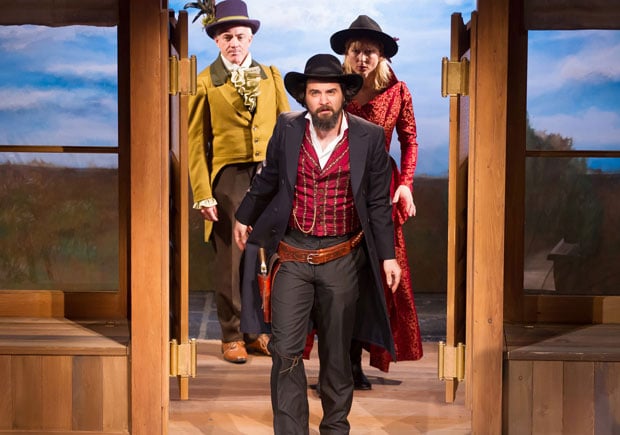What era better sums up the rampant, aggressive masculinity and virulent sexism of The Taming of the Shrew than the Old West? When women are bought and traded like cattle, it makes sense that there’d be cowboys in the picture, and those spurs sure come in handy for breaking unruly wives like obstreperous horses. Aaron Posner, who directs the Shrew currently playing at the Folger, acknowledges in his director’s notes that the setting has been done before (and recently–a similarly themed production closed just last month in New York). But as a way into one of Shakespeare’s most troublesome plays, it’s surely enticing.
This show, punctuated with gorgeous original folk songs by Cliff Eberhardt (who plays a blind musician sat in front of a saloon piano), is a treat from start to finish, but troublesome nevertheless. Posner’s dispensed with the framing device Shakespeare chose to exonerate himself from the play’s stunning misogyny–an elaborate introduction that presented the tale of Katharina and Petruchio as a play-within-a-play, staged for a drunken beggar who thinks he’s a nobleman. Instead, the cast themselves introduce the show, which opens with a disconsolate Kate (Kate Eastwood Norris) drowning her sorrows in a whiskey bottle. We don’t know why she’s so sad, but presumably her chosen lifestyle of furious rages and energetic bar fights isn’t quite doing the trick.
Posner flips two characters from male to female: Baptista Minola (Sarah Marshall)–who’s now mother, rather than father, to Kate and her more good-natured sister, Bianca (Sarah Mollo-Christensen)–and Tranio (Holly Twyford), servant to Lucentio (Thomas Keegan), who thanks to Twyford’s manifold skills, is nicely portrayed as being a downtrodden-but-practical woman in love with her master. Twyford seems born to play one of Shakespeare’s cross-dressing heroines: she has the swagger and the sensitivity in spades. Lawrence is a hoot as the shotgun-toting Baptista, downing glass after glass of Old Overholt as she barters away her eldest daughter to Petruchio (Cody Nickell), but the fact that it’s a woman doing the horse trading doesn’t make it seem any less egregious.
To say that this is a first-rate cast is an understatement. When you have Twyford, Craig Wallace (Gremio), and Danny Scheie (Grumio) in minor roles, it’s fair to believe you’ve got quite a show on your hands. Scheie and James Gardiner (Biondello) are delightful as two servants, the first bitchy and maniacal (as you’d expect from the recent star of You, Nero); the second buffoonish and slapstick. In Tony Cisek‘s wood-panelled, oak-aged set, the actors fly in and out of a pair of saloon doors, downing shots every time someone breaks into iambic pentameter (which incidentally would be the world’s worst drinking game). Amid all this Americana, the stateliness with which the characters speak is almost alarming at first. But the arrival of Petruchio, who talks kinda like Yosemite Sam and has a true cowboy swagger, amps up the rootin’-tootin’ outlaw-iness of it all.
Which brings us to the play’s central romance between Kate and Petruchio. Real-life married couple Norris and Nickell have an undeniable chemistry as the two hot-headed lovers, but there are issues in this relationship that a thousand inventive themes or crafty casting tweaks can’t fix. Petruchio is introduced as a loveless bachelor who seeks a fortune; he marries Kate for her money (he’s told that she’s “very rich, and . . . very rich”), and against her will. When Norris spits on his hand, Nickell visibly shakes with rage; when he starves her into submission, the audience can practically see Kate’s spirit crumble. This isn’t love: It’s Stockholm Syndrome.
For all Kate’s crying into her whiskey glass, and her metamorphosis into graceful contentedness during her final insipid monologue (Women! Obey your husbands!), it’s hard not to see her as being brainwashed, even as Norris seems to wink throughout. Posner mollifies us slightly by having Petruchio give his wife the money she rightly won for him with her good behavior, but it still rankles, nonetheless. Even Shakespeare needed a way to distance himself from this misogynistic pile of codswallop. This is a fantastic, funny, inspired production, and the presence of Eberhardt gives it the cinematic aspect of a rollicking Western. But when it comes to explaining away one of the worst mistreatments of women in literature, you’re just going to have to Lubbock or leave it.
The Taming of the Shrew is at the Folger Theatre through June 10. Tickets ($30 to $65) are available at the Folger’s website.

















